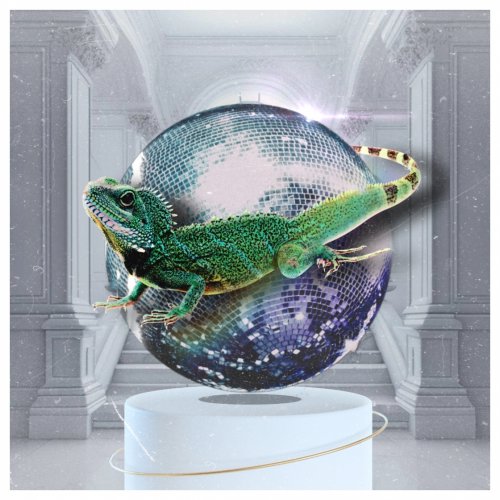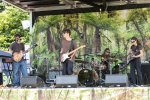Floyd Marsden - Album Review: The Disco Lizards
 After
two years in the making, Floyd Marsden releases her latest ten track album, The Disco Lizards. Although listed as alternative rock, this album features so much more than just that. There’s funk, disco, Caribbean rhythms and a slew of instruments
shimmering and shining through the mix such as Hammond organs, ornate strings and a rich range of percussive instruments. It’s a collection of songs that is very much indebted as much infatuated with the 1970’s, although there are elements that seem inspired
by The Rat Pack, and French jazz also. At its rockier parts, there are melodies reminiscent of Arctic Monkeys or Britpop bands like Pulp, while sparkling jazzy flourishes remind the listener of Elton John or Tim Minchin. Vocally, Marsden is gifted at
selecting unusual syllabic timing that break up the lyrics into unpredictable phrases. Her voice demonstrates a wide range capable of comfortably reaching out to some high notes on particular syllables which supplies some songs their catchiest hook, although
for the majority of the album she sings in a clear, and controlled contralto range. Melodically speaking, Bowie stands out as a major influence, not only as a 70’s icon, but no doubt as inspiration for striving to find the path less travelled when it
comes to vocal lines.
After
two years in the making, Floyd Marsden releases her latest ten track album, The Disco Lizards. Although listed as alternative rock, this album features so much more than just that. There’s funk, disco, Caribbean rhythms and a slew of instruments
shimmering and shining through the mix such as Hammond organs, ornate strings and a rich range of percussive instruments. It’s a collection of songs that is very much indebted as much infatuated with the 1970’s, although there are elements that seem inspired
by The Rat Pack, and French jazz also. At its rockier parts, there are melodies reminiscent of Arctic Monkeys or Britpop bands like Pulp, while sparkling jazzy flourishes remind the listener of Elton John or Tim Minchin. Vocally, Marsden is gifted at
selecting unusual syllabic timing that break up the lyrics into unpredictable phrases. Her voice demonstrates a wide range capable of comfortably reaching out to some high notes on particular syllables which supplies some songs their catchiest hook, although
for the majority of the album she sings in a clear, and controlled contralto range. Melodically speaking, Bowie stands out as a major influence, not only as a 70’s icon, but no doubt as inspiration for striving to find the path less travelled when it
comes to vocal lines.
The album is rich with metaphor, some objects recurring throughout such as mirror balls and mirrors, lizards and lounges, broken hearts and late nights. There are songs about identity, love, lies and coping with perceived sin. Sure, it all seems fun and
colourful, but also quite restrained and mature in its delivery. There’s not much wild expression to be found across the ten songs; rather, everything is ornate, precise and rather dryly and deliberately delivered. It makes for a very well-produced
album with a balanced mix, (mastered by Voodoo Bloo and Adult Friends’ Jackson Kidd), albeit one with a few too many low energy ballads, especially towards the end. But, then again, maybe that’s the point – there’s some honest, thought-provoking
lyrics that dwell on the mind days after hearing them and the maturity required to state such intelligent lyrics would be wasted on disco tunes that are better to dance to, than to listen carefully to.
The album starts off strong with a jazzy, Calypso inspired number, She Must Be Fun At Parties which features some funky drums and percussion. Immediately there’s talk of identity: "I can’t help but think I don’t really belong, I can’t place where the feelings from," but the verse is merely building to showcase one of Floyd’s greatest tricks: the transition from verse to chorus. When it arrives, there’s a sudden boost to the song and it seems to unfold from monochrome into colour. "Isn’t this just so cinematic, Isn’t this just so typical … you’re getting way too cynical" she warns the listener or partygoer, perhaps hinting that things are not always as they seem and not all that glitters is gold. There’s another cool transition into a minor feel for a disco section that is as dramatic as any ABBA bridge.
Don’t Worry About Jesus is simple, catchy and anthemic. A guitar line draws the listener in as Floyd tells a tale of late night and errant thoughts. "Never mind the curfew, relax about the doormen, stretch this night to the very end," she tells us, and we follow her through into the chorus with a hypnotic piano. There’s some great rhythm to be found here, complete with a vocoder on the voice and ending with some flanger madness.
Butterfly Effect is a little less disco, a bit more lounge. There’s a Calypso rhythm decorated with subtle percussion tinkering away as the song explores a slower beat. Arctic Monkeys themselves are mentioned with lyrics such as "Alex Turner through the speakers in the car, dedications to the stage in a lounge bar," and the self-referential lyrics continue with "I know that fate, you’re trying to pretend, that those hour-long drives, just come naturally, but it looks a little gay to a freak like me." The song concludes with a spacey ethereal end as the instruments drown in reverb.
Miss Charmer is a speedy, funky number that has a brilliant line: "The mirror will take one look and tell you otherwise". Harmonised voices add another element to be found on 1970’s rock albums.
If there is one song on the album that is at all heavy, it has to be Heart and the Wings which features some fiery but not particularly ferocious drum playing, and a throbbing Hammond organ part. Floyd sings at her angriest: "you’re not sorry that it happened, you’re just sorry you were caught."
The Disco Lizards is a stand out ballad, even if it is very sad and dramatic, drawing on comparisons to Nick Moon, Elton John at his most poignant and Elliot Smith. The piano is the instrument that really leads the band here, although there is some impressive drum rolls and dramatic violin swells that adorn this. As with many other tracks, the chorus transition is what really pushes the song forward when she sings "But is it really a last dance, without the stare of the disco lizards?" The best line in the song, (perhaps the whole album?) comes later with "But even if this doesn’t go anywhere, that’s still an OK place to go." Really love the dramatic violin flourish at the end.
After this contemplative song, a more upbeat song would be welcome, but instead the album leans into another ballad with Forgetful Type. There are swooning strings as Floyd croons "…and sometimes I wish I was the forgetful type." It’s not a boring song, but its placement in the album means I was itching for the tune to finish.
Hello Again is a little funkier, but the drums sound a little laggy (or perhaps it’s just a complex rhythm I can’t quite comprehend). There’s some more Arctic Monkey’s riffing on this one, but some of the magic is missing somehow.
Auburn Thomas has the pep that would have been appreciated directly after the dramatic refrains of The Disco Lizards as it is faster and has a bit more life. There’re some impressive jazzy piano lines that use the blues scale or a few chromatic notes that add a splash of unexpected colour. The 70’s spirit is strong on this one – there’s even the lyrics "Ramble on" for Heaven’s sake! Sure enough, the chorus erupts after a little pause, then "God! I wish I was in the 70's!" Floyd sings, perhaps at her most passionate. The song ends with a bustling organ solo, and some guitar fills that Mick Ronson would have been proud to play. This song is cowritten lyrically with Freya James, and is a great tune that maybe should have come earlier in the track listing.
The album ends with When You Know, a melancholy sonnet filled with some of the imagery the album has touched on such as lizards, dancefloors and unrequited love. "Absurdist lyrics plaguing your sound" is an unexpected lyric, but I assume this may be some quip to herself. There’s a classic separation of syllables on "I sup-pose" that is charming.
What to make of it? With cover art featuring a lizard in front of a sparkling disco ball set in a classical palace, you might expect a more flamboyant recording. There’s some fun jazz influenced disco tunes but an equal number of contemplative ballads. You can’t fault the performances on the record (featuring Adult Friends and Burnt Out Graduates’ Billy Bathgate on the majority of the drum tracks, and Jackson Kidd not only behind the desk producing this record, but also behind the drumkit on Forgetful Type and on guitar on She Must Be Fun At Parties) nor the insightful lyrics which can be inspiring one minute and then shocking in their honesty the next.
Despite drawing on so many established genres of music from previous decades, it remains utterly unique amongst current New Zealand releases, showcasing melodies that are unexpected with vivid flourishes that embellish the already appealing songs. It’s more mature than I expected, but with that comes a sensitive and balanced production where every detail can be heard. It’s also a very personal record, but it fluctuates between what seems private contemplative spaces like gazing into mirrors, and public dancefloors where the mirrors are twirling and above, offering a fracturing rather purely reflective function. Perhaps this is where the album’s themes truly coalescence: celebrating the roles that mirrors play in different spaces as lizards, traditional masters of disguise and deception, shed their skins in preparation for the next disco.
About Floyd Marsden

Visit the muzic.net.nz Profile for Floyd Marsden
Releases
Other Reviews By Nicholas Clark
 Search For Yeti - Album Review: Dark So Soon
Search For Yeti - Album Review: Dark So Soon
28 Nov 2024 // by Nicholas Clark
Search for Yeti’s first full length album Dark So Soon offers a rich banquet of genres and melodies. The record oscillates between predicting a future filled with either dread or hope, while the band either softly establishes a tender ambience or plays catchy power pop.
Read More...
 DarkWater - Album Review: Turning Point
DarkWater - Album Review: Turning Point
13 Nov 2024 // by Nicholas Clark
Turning Point is a complex, dynamic album that takes the listener on an intense ride. There are mysterious, fragile, powerful and gritty moments to discover on this ten-track offering that sounds both balanced and refined.
Read More...
 Job Site - EP Review: The New Zealand Experience
Job Site - EP Review: The New Zealand Experience
15 Oct 2024 // by Nicholas Clark
Emerging from the Waikato, high energy punk band Job Site showcases their special blend of comedic music on their latest offering, the 4 track The New Zealand Experience EP. The band plays fast and heavy throughout the recording, with rhythms that range from oi-punk, thrash music and even a little 2000’s indie rock.
Read More...
03 Sep 2024 // by Nicholas Clark
Six iconic venues. Twenty eight acts.
Read More...
 Voodoo Bloo - Album Review: Dead-end Rodeo
Voodoo Bloo - Album Review: Dead-end Rodeo
28 Aug 2024 // by Nicholas Clark
Rodeos, at least in this country, aren’t perceived as sport nowadays. If the term is used at all in New Zealand it usually refers to a metaphor for an intense struggle to survive or to conquer the unconquerable, if but for fleeting moment.
Read More...
 Gig Review: Bad Schematics @ Moon, Wellington - 26/07/2024
Gig Review: Bad Schematics @ Moon, Wellington - 26/07/2024
27 Jul 2024 // by Nicholas Clark
Fresh from picking up numerous awards in the recent National Battle of the Bands competition, Bad Schematics have embarked on a North Island tour including Tauranga, Auckland and their hometown Palmerston North, to promote their newest album,C O L L I D E. Tonight, along with winners of the competition for this year, Adoneye, finalists Donal and The Bucks and last year’s second place winners, Dave and the Dirty Humans, Bad Schematics hit Wellington’s favourite underground alternative music venue and pizzeria, Moon.
Read More...
 Gig Review: Floyd Marsden @ Valhalla, Wellington - 18/07/2024
Gig Review: Floyd Marsden @ Valhalla, Wellington - 18/07/2024
19 Jul 2024 // by Nicholas Clark
Although technically a sad affair, (as it was to be final of Floyd Marsden’s string of local shows promoting her album The Disco Lizards), the atmosphere in Valhalla was uncharacteristically filled with retro vibes but the usual friendly faces. In support for this show was Adult Friends, spearheaded by vocalist/guitarist Jackson Kidd who was also the producer of The Disco Lizards.
Read More...
 SuperMild - EP Review: SuperMild
SuperMild - EP Review: SuperMild
11 Jun 2024 // by Nicholas Clark
SuperMild is a busy band playing lots of venues and entertaining crowds with their blend of reggae tinged psychedelic rock. Their debut, self-titled four song EP is out now, and it spans the many sounds the band can summon with just three members.
Read More...
Most Viewed Artists
Latest Galleries
NZ Top 10 Singles
- APT.
ROSÉ And Bruno Mars - DIE WITH A SMILE
Lady Gaga And Bruno Mars - BIRDS OF A FEATHER
Billie Eilish - TASTE
Sabrina Carpenter - I LOVE YOU, I'M SORRY
Gracie Abrams - ESPRESSO
Sabrina Carpenter - SAILOR SONG
Gigi Perez - LOSE CONTROL
Teddy Swims - A BAR SONG (TIPSY)
Shaboozey - GOOD LUCK, BABE!
Chappell Roan









 Report A Problem
Report A Problem

